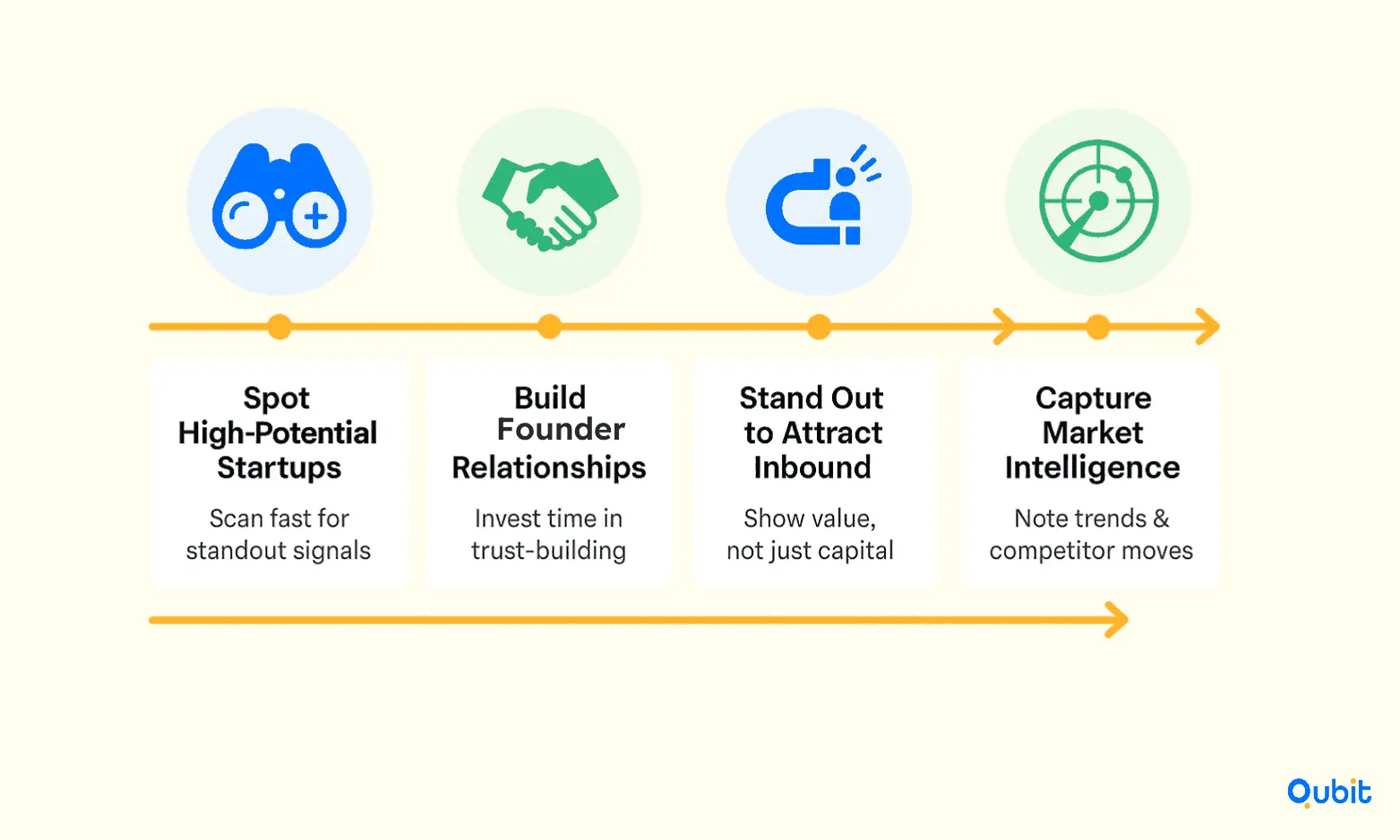Events and conferences are where a lot of startup discovery happens in the open. Investors do not just wander booths and hope for magic. They use scouting tools, tight networking loops, and quick evaluation habits to find the few startups worth a second meeting.
The urgency is real on the corporate side too. A KPMG survey found that 88% of corporate executives see collaboration with startups as essential to their innovation strategy. That level of demand is why investor scouting has become more systematic and more competitive.
This guide breaks down how investors actually scout at events, what signals they look for on the spot, and how they follow up after the conference. It also shows how founders can position themselves to get remembered, not just “met.”
Investor Tactics for Startup Scouting at Events & Conferences
Events and conferences are not casual networking for investors. They are efficient scouting grounds where relationships start, fast judgments get made, and deal pipelines get built.
The best investors show up with a plan. They use targeted tactics to find the right founders, structured notes or scorecards to compare opportunities, and platforms to track follow-ups before momentum dies.
For large organizations, the pressure is rising. A 2017 survey of 500+ C-suite executives found that 65% believed 40% of Fortune 500 companies would no longer exist in 10 years due to digital disruption. That is why startup scouting is not a nice-to-have. It is part of staying relevant.

However, the sheer volume of startups, noise, and time constraints mean that simply “attending” an event isn’t enough. Successful investors adopt deliberate tactics that allow them to:
- Efficiently identify the most promising startups among hundreds or thousands of participants
- Build authentic relationships with founders and other ecosystem players, which often become the foundation for future deals
- Differentiate themselves as thoughtful, value-adding partners, attracting quality inbound opportunities
- Gather market intelligence on emerging trends and competitive dynamics that inform broader investment theses
Networking at these events is not just socializing, it’s part of a strategic scouting workflow. Networking creates trust and opens doors to otherwise hidden opportunities. Structured evaluation practices help investors objectively assess and prioritize startups amidst the bustle.
Innovation Matchmaking & Future Solutions
Matching emerging technologies with critical missions requires a dynamic approach, and Booz Allen’s dual-use technology scouting framework exemplifies this. By identifying innovations that serve both commercial and governmental purposes, Booz Allen ensures that advancements in fields like AI, 5G, quantum computing, and zero trust security are strategically aligned with national security and corporate objectives.
AI-Driven Scouting for Emerging Technologies
The rapid evolution of technology demands precision in identifying solutions that address complex challenges. Booz Allen’s AI-powered startup scouting methods streamline this process, enabling the discovery of groundbreaking innovations tailored to specific mission needs.
The impact of AI-driven innovation cannot be understated. In 2024, AI and machine-learning companies attracted $131.5 billion, one-third of all global venture capital. This enormous funding flow highlights why event-based scouting increasingly focuses on these transformative technologies.
Bridging Breakthroughs to Missions
Booz Allen Ventures plays a pivotal role in connecting startups and innovators with federal missions. This resource not only accelerates the adoption of cutting-edge technologies but also fosters partnerships that drive impactful results. A notable example is the collaboration with Hidden Level, Inc., which demonstrates how corporate-startup partnerships can enhance national security capabilities.
By integrating dual-use technology scouting with AI-driven methods, Booz Allen is redefining innovation matchmaking, ensuring that emerging technologies are effectively aligned with both governmental and corporate missions.
Corporate Startup Scouting Methods
Investor tactics for startup scouting at events & conferences are essential for organizations aiming to stay competitive in fast-evolving industries.
1. Inbound Startup Scouting: A Passive Approach
Inbound startup scouting relies on startups reaching out to corporations through open calls, pitch events, or unsolicited proposals. While this method requires minimal effort, it often proves inefficient as it limits the pool of potential startups to those actively seeking partnerships. This passive approach can result in missed opportunities, as many high-potential startups may not be aware of or interested in submitting inbound requests.
2. Dedicated Internal Scouting Teams
Many corporations establish internal teams tasked with identifying and evaluating startups. These teams actively research industry trends, attend startup events, and build relationships within the entrepreneurial ecosystem. Internal scouting teams offer the advantage of aligning closely with the company’s strategic goals. However, they require significant resources and expertise to operate effectively.
For a deeper understanding of structuring proactive scouting methods, refer to the detailed steps outlined in how to create a deal sourcing strategy.
3. Specialized Scouting Platforms
Specialized platforms, such as startup databases and innovation hubs, provide a streamlined way to discover and evaluate startups. These platforms use advanced algorithms and filters to match corporations with startups that meet specific criteria. While they save time and expand the search scope, they may lack the personalized insights that internal teams can provide.
Why a Multi-Channel Approach Matters
The scope of corporate involvement continues to grow. One in six startup deals now involve corporates, a rate three times higher than just ten years ago. This trend makes leveraging multiple channels essential for staying competitive.
Relying solely on inbound requests can lead to inefficiencies, as it limits the corporation’s ability to proactively seek out startups that align with its goals. A multi-channel approach, combining inbound tactics with internal teams and specialized platforms, ensures a broader and more targeted scouting process. This strategy not only increases the chances of finding the right startups but also fosters a more dynamic and innovative corporate culture.
By diversifying their startup engagement methods, corporations can maximize their chances of discovering groundbreaking innovations while mitigating the risks associated with relying on a single scouting channel.
4. Adapting Scouting Strategies to Regional and Sector Differences
Corporate startup scouting methods must account for differences in regional ecosystems and industry sectors. Local market maturity, competition, and regulatory environments can significantly influence the effectiveness of scouting efforts. For example, strategies that work in established hubs may not translate directly to emerging markets.
Tailoring your approach involves understanding the unique challenges and opportunities present in each region or sector. In mature ecosystems, competition for top startups is fierce, requiring faster decision-making and deeper relationship-building. In contrast, emerging markets may demand more groundwork, such as building trust and navigating unfamiliar legal frameworks.
Sector-specific nuances also matter. Highly regulated industries, like healthcare or finance, often require specialized due diligence and compliance checks. Meanwhile, technology-driven sectors may prioritize rapid prototyping and pilot programs. By aligning your scouting strategy with local and industry-specific realities, you increase the likelihood of sourcing startups that truly fit your innovation goals.
Benefits of Specialist Startup Scouting Providers
Specialist startup scouting providers bring a unique depth of expertise to the table, offering refined evaluation methods that go far beyond conventional metrics. Their ability to combine advanced analytics with qualitative insights ensures a more comprehensive approach to identifying startups that align strategically with your goals.
Enhanced Startup Evaluation
Despite widespread prioritization, only 6% of executives are satisfied with their innovation performance, revealing a serious gap that refined scouting methods aim to close.
Startup Scouting providers excel in startup evaluation by utilizing cutting-edge tools and methodologies. They analyze beyond surface-level data, diving into aspects such as market potential, scalability, and team dynamics. This analytical startup scouting approach ensures that every startup is assessed holistically, reducing risks and increasing the likelihood of success.
Strategic Alignment
One of the standout advantages of specialist providers is their focus on strategic alignment. They don’t just identify promising startups, they ensure these startups fit seamlessly within your broader objectives. This tailored approach saves time and resources while fostering partnerships that drive long-term growth.
Balancing Deal Sources
Insights on balancing different acquisition approaches are reflected in inbound vs outbound startup deal flow, providing a nuanced view of deal management techniques. Specialist scouting providers complement other deal sources, creating a balanced strategy that maximizes opportunities across the startup ecosystem.
Structured Startup Engagement for Lasting Partnerships
Building on balanced deal sourcing, specialist providers often facilitate structured engagement with startups. This process includes conducting in-depth interviews to assess alignment, piloting projects to validate solutions, and maintaining ongoing relationship management. Such a framework not only accelerates collaboration but also helps both parties identify mutual value and reduce partnership risks.
By integrating advanced analytics, qualitative insights, and strategic alignment, specialist startup scouting providers elevate the process of identifying and evaluating startups, ensuring stronger partnerships and better outcomes.
How to Maximize your Outcomes at Conferences and Startup Events
Investor tactics for startup scouting at events & conferences begin with setting clear objectives and preparation.
Set Clear Objectives and Preparation
- Define Your Focus: Before the event, align on which sectors, stages, and business models you're targeting. This helps filter noise and ensures your time is spent with startups that match your interests.
- Research the Attendee List: Leverage event apps, conference websites, and pre-arranged meeting platforms to identify high-potential startups in advance. Reach out to founders before the event to schedule short meetings or coffee chats.
- Prepare Engaging Questions: Develop concise, targeted questions to quickly assess fit, such as team background, traction, and unique value proposition
Download the investor event scouting checklist for practical steps.
Use Event Tools and Targeted Networking
- Use AI-Powered Matchmaking: Many conferences now offer AI-based event apps that recommend relevant startups based on your interests, enabling you to efficiently book meetings with founders who match your criteria.
- Investor-Only Lounges: Take advantage of exclusive networking spaces for investors to exchange insights, share references, and spot secondary deal flow through peer introductions.
- Panel Participation and Judging: Join as a panelist or judge for pitch competitions to gain behind-the-scenes access and evaluate startups under pressure, these public evaluations often reveal founder strengths and weaknesses.
Maximize Pitch Competitions and Demo Days
- Attend Startup Showcases: Prioritize pitch competitions and showcase areas, where you can efficiently sample multiple startups’ pitches in a condensed timeframe.
- Shortlist for Follow-Up: Use a standardized scorecard to quickly score and shortlist promising teams for deeper, private conversations after the event.
- Instant Feedback: Offer on-the-spot feedback to founders. This not only builds goodwill but also opens doors for deeper engagement and sets you apart as a value-adding investor.
Event Edge Cases and Practical Solutions
If event apps are unreliable, have a backup method to manually identify and schedule meetings with startups.
Navigating VC Scout Checks and Confidentiality Risks
After engaging with startups at events, it is important to recognize the risks associated with VC scout checks. These non-committal offers can expose founders to confidentiality concerns and strategic information leaks. Both investors and startups should prioritize transparency, protect proprietary information, and seek alignment before sharing sensitive details.
Successful Corporate-Startup Scouting Case Studies
Structured startup scouting has proven to be a game-changer for corporations aiming to innovate and stay competitive. Real-world corporate-startup case studies, such as the collaboration between Vestr and Julius Baer, highlight how tailored engagement processes can optimize financial instruments and drive strategic success.
Case Study: Vestr and Julius Baer
The partnership between Vestr, a fintech startup, and Julius Baer, a leading private banking group, exemplifies the power of structured startup scouting. Vestr specializes in digital tools for managing Actively Managed Certificates (AMCs), a niche but growing area in financial services. Julius Baer identified Vestr through a systematic scouting process, recognizing the startup’s potential to enhance their AMC offerings.
Through this collaboration, Julius Baer integrated Vestr’s platform to streamline the management of AMCs, reducing operational complexities and improving transparency for their clients. The success of this partnership underscores the importance of aligning corporate needs with startup solutions, facilitated by a well-structured scouting methodology.
Evidence of value extends across industries. Cyngn secured $308,000 in new bookings for DriveMod vehicles and their 22nd U.S. patent for AI-powered autonomous tech in Q1 2025. This case highlights how identifying innovative partners through formal scouting directly drives both revenue and IP growth.
Sustaining Momentum After Success
While initial collaborations like the Vestr-Julius Baer partnership can yield impressive results, maintaining momentum is equally critical. The examination of factors influencing investment momentum is further deepened by why deal pipeline stagnates, offering clarity on sustaining an active deal flow. Continuous engagement ensures that the benefits of a successful partnership extend beyond the initial implementation phase.
By adopting structured scouting and fostering long-term collaboration, corporations can unlock innovative solutions that drive growth and efficiency.
Startup Scouting Websites/Tools
Exploring the right tools and strategies is essential for effective startup scouting. Below is a curated list of startup scouting resources to help you deepen your understanding and refine your approach:
- Crunchbase: A comprehensive platform offering data on startups, funding rounds, and industry trends.
- CB Insights: Known for its in-depth market intelligence, this tool provides insights into emerging startups and sectors.
- AngelList: A go-to resource for discovering early-stage startups and connecting with founders.
- PitchBook: Ideal for accessing private market data, including startup valuations and investor activity.
- Startup Genome: Offers detailed reports on startup ecosystems worldwide, helping you identify key hubs and trends.
Each of these resources brings unique value, enabling you to tailor your scouting efforts based on your specific goals.
Post-Event Follow-Up
How to sustain engagement effectively:
- Create a tailored engagement plan: Segment startups based on their interest level and stage. For warm leads, plan periodic check-ins; for those needing more nurturing, share relevant insights, introductions, or invitations to future events.
- Be content and value-add: Send curated articles, market trends, or feedback relevant to their sector or business model, demonstrating your expertise and ongoing interest.
- Invite startups to your ecosystem: Host roundtables, workshops, or informal meetups that provide founders opportunities to network with your portfolio and advisors.
- Maintain transparency and responsiveness: Be clear about the investment process and timelines, and quickly address queries or requests. Even if you’re not investing immediately, stay engaged with constructive feedback and support.
- Monitor startup progress: Keep track of their milestones and pivots through tools or periodic updates so your conversations remain timely and relevant.
Conclusion
Events and conferences are where deals start fast and quietly. Investors arrive with a plan, filter ruthlessly, and use quick signals to decide who earns a second conversation. That is why founders need more than a friendly intro. You need a tight positioning line, proof that you understand your buyer, and a follow-up that lands before the event buzz dies.
The best outcomes come from treating conferences like a scouting workflow, not a social calendar. If you want help turning event meetings into real investor conversations, use our Investor Outreach service. We’ll help you target the right rooms, sharpen your message, and run follow-ups that convert.
Key Takeaways
- Investor tactics for startup scouting at events hinge on combining data-driven analysis with real-world case studies.
- Booz Allen’s innovation matchmaking demonstrates the power of dual-use technology scouting.
- Corporate startup scouting methods vary from inbound requests to dedicated internal efforts.
- Tenity's structured approach underlines the importance of a clear startup thesis and a vetted deal flow.
- Specialist startup scouting providers deliver unique insights that enhance strategic decision-making.
Frequently asked Questions
What tools help with startup scouting at events?
Platforms like Crunchbase, CB Insights, and AngelList provide comprehensive data and analysis to simplify startup scouting at events.






